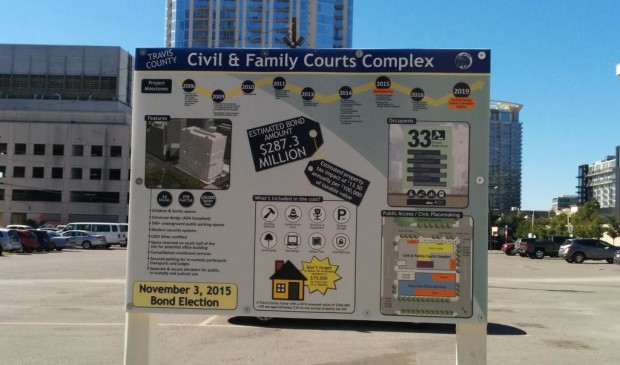County to issue non-voter approved debt for courthouse
Friday, January 18, 2019 by
Ryan Thornton The Travis County Commissioners Court approved the use of Certificates of Obligation to fund its new civil and family courthouse Tuesday morning.
“This is not something that we just want,” said Commissioner Jeff Travillion. “This is a statutory responsibility that is given to us.”
According to the Planning and Budget Office, the total amount of debt issued to taxpayers will not exceed $328.5 million paid over 20 years. The average taxable homestead is expected to see an annual impact of $35.11 over the entire debt term.
Counties are authorized by state law to use COs for the purpose of funding necessary public works without voter approval. Given the disrepair of Travis County’s Heman Marion Sweatt Courthouse, in use since 1931, and the county’s mandate to provide for the justice needs of its residents, the commissioners agree that the project is an appropriate and necessary use of its power to issue debt.
Travis County will be making a down payment of $16.1 million with cash on hand and will use future revenue to make payments on the issued debt to relieve some of the burden on taxpayers. The county plans to put $52.2 million generated in ground lease revenue from its 308 Guadalupe Street site toward the debt over the next 20 years.
The county initially wanted to build a new civil and family courts complex at 308 Guadalupe, but just over 50 percent of voters rejected the proposal in 2015. The site, however, turned out to be highly desired by the private sector and the county is now leveraging it through a 99-year lease that is expected to generate a total of $425 million in revenue.
Following the 2015 vote, the county went through a long process of choosing a new site and development plan for a civil and family courthouse. In July 2018, the court signed an agreement with Travis County Courthouse Development Partners LLC for development of a new court facility and named 1700 Guadalupe St. as the potential site.
In accordance with the law, the county waited three years from voter rejection of the 2015 proposal before issuing COs for this project. Nonetheless, County Judge Sarah Eckhardt emphasized that the current proposal is not what voters were looking at in 2015.
Commissioner Gerald Daugherty repeatedly voiced concern that voters might see this decision and come to the conclusion that the county is doing exactly what voters had asked them not to do in 2015 – and with an even higher price tag this time.
“It puts you in an awkward spot when you’re trying to convince somebody that you’re moving forward on something when the voters told you no,” Daugherty said.
Eckhardt challenged Daugherty’s conflation of the two projects, insisting that voters had rejected a specific proposal, not the construction of a new courthouse in general.
“Please don’t keep saying that we are going against the voters’ will,” Eckhardt said. “They told us no to a specific dollar figure, a specific financing mechanism on a specific location, a location that was dearly prized by the private development interests.”
Planning and Budget staff added that the prices of the two proposals are similar after all variables are taken into account. While the total cost of the new courthouse is $344 million, the old project was estimated at roughly $324 million before time value of money and escalation of construction costs were considered.
Eckhardt added that the fundamental concern is cost to the taxpayer, not total project cost.
“We are right in line with the overall project costs that we proposed back in 2015, but the more impactful number really is how much would it cost the average taxpayer for this piece of public infrastructure, and we’ve actually brought the cost to the average taxpayer down since 2015,” Eckhardt said.
After a long discussion, Travillion made a motion and the commissioners unanimously approved the issuance of the $328.5 million for the court facility.
Commissioner Brigid Shea was absent Tuesday.
The Austin Monitor’s work is made possible by donations from the community. Though our reporting covers donors from time to time, we are careful to keep business and editorial efforts separate while maintaining transparency. A complete list of donors is available here, and our code of ethics is explained here.
You're a community leader
And we’re honored you look to us for serious, in-depth news. You know a strong community needs local and dedicated watchdog reporting. We’re here for you and that won’t change. Now will you take the powerful next step and support our nonprofit news organization?










